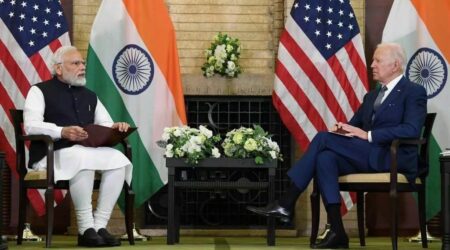By The SATimes News Service
By Bakul N. Matalia
In this Covid era when regular lives are upended, outside normal activities are severely curtailed or shut out of reach and travelling inadvisable, there is plenty of time at hand. Sometimes I can’t help but reflect on my childhood memories. As a volunteer of Shanti Fund, I am involved in planning for the finale of Mahatma Gandhi’s 150th birth anniversary celebrations in New York. At home during down time, I could not help but reminisce how Gandhiji played a seminal role in our family and in my upbringing in rural India.
As far back in my early childhood as I can remember, Gandhiji was revered in my family as the epitome of saintliness, honesty, unscathed character, simplicity, a leader, fighter and most strikingly, the man of truth. I was surrounded by a strong Gandhian ethos at home, which was in an ashram setting in a small rural town in Gujarat, India, where my grandfather was managing director. Every evening, all residents of the ashram called Khadi Gramodhyog Waadi, including children, met in a big central hall for evening prayer. I vividly remember that prayers were not of any one religion but inclusive of most religions. After the prayers, my grandfather – or often visiting Gandhian scholars — would relate some anecdotal stories of Gandhiji, which invariably extolled Gandhian virtues. Children like me often got transfixed. In our juvenile minds, Gandhiji was a towering personality and touchstone of human virtues. My grandfather, very caring and loving but a strict disciplinarian, imparted endearing Gandhian qualities to me. Every member of our family wore khadi clothes. I did all my chores myself like washing my own clothes and even helped in household duties. Up to my secondary schooling, I used to spin charkha one hour daily.

Bakul Matalia with his newly wedded wife and parents. Mahatma Gandhi blessed his in-laws at their wedding with these words: “May truth offer you salvation, this truth will lead to celibacy, if you adopt this truth, your wedding life will be easier.”
During the height of Gandhiji’s popularity and India’s independence movement, my grandfather bought in 1945 a Gandhi statue made from plaster of paris for 11 rupees (equivalent to $11 in those days). The statue captures the authentic flavor of Gandhiji’s walking style with cane, wearing hand spun khadi clothes and sporting his trademark round eye-glasses. This statue has become our family heirloom. Grandpa gave it to my father, and my father passed it on to me and I brought it with me to the US. Over seven decades in our family, it had a few chips and scrapes and had lost its original luster. I found an expert in New York City, who is reputed to restore such antique and rare museum pieces. He did a wonderful job restoring the statue, bringing back the original luster, yet keeping the antique, original look. The statue purchased for Rs 11 in 1945 cost almost $1100 a few years ago to restore! However, no price can match the irreplaceable, invaluable family heirloom. A grand uncle too had an enormous influence on our family. He was a strict Gandhian. He left home after college and joined the Gandhi-led freedom struggle. During protests against the British rule, he was jailed. His entire life was dedicated to inculcating the Gandhian values in young children and youths. He went on to establish a Gandhian ashram in rural Saurashtra in the late 1950’s. Today it is still flourishing, graduating thousands of students in modern agriculture, farming, small industries, math and science. My wife’s grandfather too had dedicated his life to the Gandhian cause and stayed and worked with the Mahatma. He had a deep desire that Gandhiji should officiate the wedding of his eldest son. On January 17, 1939 at the Bardoli Ashram in Gujarat, under a tree, in the presence of only five people each from the groom’s and from the bride’s family, the wedding was performed in the presence of the Mahatma. Gandhiji had strict codes of conduct and therefore, there was no ostentation, no dinner party or gifts or dowry. Most importantly, since the newly-weds were young, they had to observe two years of celibacy. The couple decided to serve in the Bardoli Ashram with Gandhiji for two years. That couple were to become my in-laws. When my parents got married, both families had decided months in advance that the wedding date will be January 30, 1948 at 5:15 PM! Little did anyone know that that exact moment will be permanently marked in the world history as infamous when the world lost the apostle of peace. Just as the wedding ceremony started, Sardar Patel announced on radio the shocking news of Gandhiji’s assassination. At the wedding, as the festive mood turned into grief, all decorative lights were turned off, music stopped and all delicacies were donated to the poor. All family members left for the mourning prayers, leaving behind just my wedded parents with the priest and an instruction to finish the rest of the rituals fast. The entire town was under the spell of shock and ghastly silence. Since no vehicle was available, the newly-wed couple walked in their wedding attire to an empty home with no one to welcome them. They, however, took their plight and strange wedding ceremony in their stride. This story will be told and retold in my family for generations. One set of my parents (in-laws) started their journey as a wedded couple under a tree in an ashram in the august presence of Gandhiji. Nine years later, another set of my parents started their married life at the exact moment Gandhiji left this world giving his last blessings. Twenty-five years later, I got married to a woman raised in a Gandhian family. The virtues of Gandhiji instilled in me and my wife from childhood, of simplicity, contentment, generosity and selfless service have suffused our lives. Exemplary lives of my grandparents, great uncle, parents and growing up and married into a Gandhian family has enriched our lives. Volunteering in Shanti Fund to spread the Gandhian values of Enlightenment and Peace through Education in school children has given me an additional purpose in life.

Bakul Matalia is Volunteer of Shanti Fund and lives in Sayville, Long Island.












